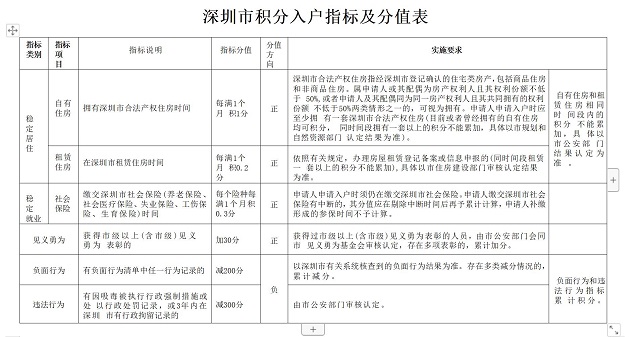Shenzhen restarted the points to enter the household. Is the threshold high or low? What are the considerations?
After a lapse of three years, Shenzhen points will be restarted. On February 8th, Shenzhen Development and Reform Commission, shenzhen public and Shenzhen Human Resources and Social Security Bureau jointly issued the Notice of Shenzhen’s Points-based Household Registration Method (hereinafter referred to as "Household Registration Method").
In July 2017, Shenzhen issued and implemented the "Measures for Shenzhen’s Points Entry (Trial)" (Shenfa Gaigui [2017] No.1), with a validity period of three years. Therefore, from July 2020 to the present, in the past three years, Shenzhen has suspended the entry of points into households. The latest "Household Entry Measures" will be implemented on February 15th.
Compared with 2017, the new "Household Entry Measures" mainly made the following adjustments:
First, apply for the basic conditions to increase the requirement of no criminal record; The second is to increase the index of being courageous; Third, the indicators of honesty and law-abiding are adjusted and divided into two indicators: negative behavior and illegal behavior; Fourth, the relevant constraints have been added to the situation of applying for entering the household with the spouse’s real estate (or the real estate shared by me and my spouse); Fifth, the minor children of the household applicant are allowed to apply for synchronization with the moving household; The sixth is to adjust the rules of stable residence points.
Regarding the contents of this adjustment, Huang Rui, director of the Regional Development Planning Institute of China (Shenzhen) Comprehensive Development Research Institute, said in an interview with CBN that the first is to strengthen the social management function of "personal public credit". Increasing the requirement of no criminal record, increasing the index of being courageous, and increasing the audit of commendation and law-abiding situation have a positive guiding role in the behavior of citizens. This kind of information is easy to obtain on the public service platform in Shenzhen, which will not increase the procedural complexity of citizens’ application for household registration, but can guide the formation of good and civilized citizens’ behavior.
The second is to pay attention to citizens’ demands and optimize the details of policy implementation. It has continued the requirement that the marriage should exist for two years. Last year’s draft for comments proposed to adjust this time limit to five years. The new policy released this time also reflects the adoption and feedback of citizens’ opinions. At the same time, optimizing the integral method of self-owned and leased housing indicators is also to face some practical problems in the process of policy implementation and optimize the implementation details.
Peng Peng, executive chairman of the Guangdong Provincial System Reform Research Association, told CBN that the previous household policy was the "Trial Measures", which can be revised and improved according to the implementation. At present, the trial period has come. The contents of the new adjustment of the household registration policy are mainly reflected in marriage, family and housing.
Regarding the reopening of points-to-households at this time, Huang Rui believes that in fact, in 2021, Shenzhen has issued a draft for comments on points-to-households, and in early 2023, the points-to-households channel will be officially reopened. On the basis of fully evaluating the service capacity and environmental carrying capacity of cities such as transportation, education, housing and medical care, and considering the actual needs of economic and social development, Shenzhen should once again send a strong signal to welcome the influx of people.
Huang Rui said that although Shenzhen has weakened the difference between registered population and permanent population in public services, the registered population is still the main target of basic public services in some cities. The registered population of Shenzhen has exceeded 6.3 million. Restarting the integration of points into households is also a measure for Shenzhen to step up the attraction of the city in the face of talent competition among cities.
Under the new "Household Measures", how many points of self-owned housing and rental housing can be successfully entered? A staff member of an intermediary agency in Shenzhen told the First Financial Reporter that the threshold for Shenzhen’s points to enter the household has increased year by year. In previous years, the number of households was about 10,000, but if the basic conditions are met, there may be hundreds of thousands of people applying for households. According to previous years’ experience, only when the score is around 300 points can you be qualified to enter the household.
According to the latest integral household index and score table, 10 years of self-owned housing can be scored 120 points, and 10 years of social security can be scored 180 points, adding up to 300 points. For rental housing, 15 years of rental housing can score 36 points, 15 years of social security can score 270 points, adding up to 306 points.

According to the "Household Measures", the number of households with points is subject to annual total control. For those who hold the residence permit of Shenzhen Special Economic Zone and have legally stable employment and legally stable residence (including lease) in Shenzhen, they will be awarded points according to the requirements of the points system, sorted according to the points, and approved to enter the household within the quota arranged in the annual plan. The number of annual household indicators is included in the overall arrangement of Shenzhen’s annual household registration population growth plan and announced to the public.